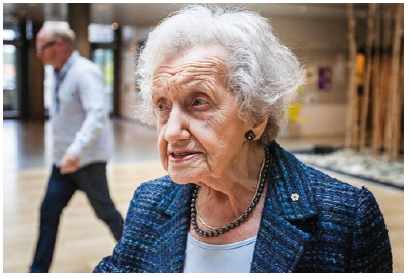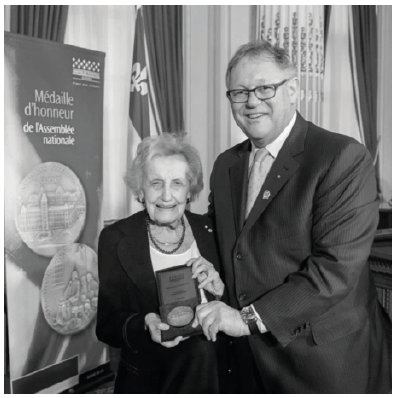Editorial 
 Creative Commons, CC-BY
Creative Commons, CC-BY
Brenda Milner: 100 Years from The Birthday
*Corresponding author: SO Eresko, Saint-Petersburg State University, 199034, St. Petersburg, Universitetskaya Emb, Russia.
Received: February 01, 2019; Published: February 14, 2019
DOI: 10.34297/AJBSR.2019.01.000522
Editorial
(Figure 1) “If you find real temptation, real excitement somewhere else, don’t be afraid to change”- Brenda Milner
Brenda Milner is a renowned British-Canadian neuropsychologist known as “the founder of neuropsychology”. She was born about 100 years ago, and as a Cambridge graduate, she started her research carreer of a neurobiologist and psychologist in 1940s. Her comprehensive contribution to the development of clinical neuropsychology thereafter was marked by several awards including the Balzan Prize for Cognitive Neuroscience in 2009 and the Kavli Prize in Neuroscience in 2014 (shared with Marcus Raichle and John O’Keefe), as well as memberships in the Royal Society of London, the Royal Society of Canada and the National Academy of Sciences. She holds more than 20 honorary degrees at universities across Europe, Canada and the USA. Currently, Brenda Milner keeps working as a professor in the Department of Neurology and Neurosurgery at McGill University (Montreal, Canada) and a professor of Psychology at the Montreal Neurological Institute with her research mainly focused on the inter-hemispheric interactions [1-5].
One of important contributions in neuropsychology by Brenda Milner was brought to the study of mechanisms of memory worsening in elderly. Due to the fact that most diseases associated with aging are characterized by memory disorders, this topic finds its high importance in the studies of gerontology. Working with patients who suffered the brain lobes removal, Brenda Milner received many new data on the complex and hierarchical organization of memory mechanisms in the brain. A unique case of an 86-year-old patient M.P. showed the brain changes due to lobectomy to remain stable for dozens of years. Neuropsychological methods have shown that in her 86 years, the patient with lobectomy was in no way inferior to her peers. Minor violations of verbal memory have been preserved throughout life without any deterioration [6-8]. This long-term and rather interesting study is described in detail in the present article (Figure 2).
References
- Banks SJ, Feindel W, Milner B, Jones Gotman M (2014) Cognitive function fifty-six years after surgical treatment of temporal lobe epilepsy: A case study. Epilepsy Behav Case Rep 2: 31-36.
- Corkin S (1984) Lasting consequences of bilateral medial temporal lobectomy: clinical course and experimental findings in H.M. Sem. Neurol 4: 249-259.
- Holdstock JS, Crane J, Bachorowski JA, Milner B (2010) Equivalent activation of the hippocampus by face-face and face-laugh paired associate learning and recognition. Neuropsychologia 48(13): 3757- 3771.
- Milner B, Branch C, Rasmussen T (1962) Study of short-term memory after intracarotid injection of sodium amytal. Trans Am Neurology Аss 87: 224-226.
- Milner B, Klein D (2016) Loss of recent memory after bilateral hippocampal lesions: memory and memories-looking back and looking forward. Journal of Neurology, Neurosurgery and Psychiatry 87(3): 230.
- Milner B, Squire LR, Kandel ER (1998) Cognitive Neuroscience and the Study of Memory. Neuron 20(3): 445–468.
- Roth H, Sommer BW (2011) Interview with Brenda Milner. Montreal Neurological Institute and Hospital Montreal, Montreal, Canada.
- Squire LR (1998) The History of Neuroscience in Autobiography. Academic, San Diego, USA.





 We use cookies to ensure you get the best experience on our website.
We use cookies to ensure you get the best experience on our website.